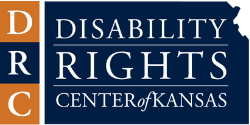Vocational Rehab & Assistive Technology
Summary
Consumers with disabilities who are receiving Vocational Rehabilitation (VR) services have a right to any Assistive Technology (AT) device or service clearly necessary to achieve their employment goal listed on their Individual Plan for Employment (IPE). DRC Kansas operated the Client Assistance Program (CAP) to provide legally-based advocacy for applicants and clients of VR services.
Eligibility
To receive services from Vocational Rehabilitation (VR), including Assistive Technology devices or services, you must:
1.Have a physical or mental impairment
2. The impairment must be a substantial impediment to employment
3. Be able to benefit from VR services by getting and keeping a jobPresumed Eligibility – If you are eligible for Supplemental Security Income (SSI) or Social Security Disability Income (SSDI) you are presumed eligible for VR services.
Financial Eligibility – You can receive VR services regardless of your financial status. Whether VR will fully pay for certain services or expect you to pay a portion of the cost will depend what the guidelines indicate you should pay. This rule does not apply to persons who are eligible for SSI or SSDI.
Your Basic Rights
A consumer may choose:
1. A Vocational Rehabilitation goal – the job you want.
2. A device or service clearly necessary to prepare for, obtain or keep the job.
3. The vendors or providers to deliver the device or service.
Frequently Asked Questions
Q: What Assistive Technology benefits does the VR program provide? A: If you need them for a job, these items or services may include: • Assistive or adaptive devices to change a work site, or reduce barriers to employment. • Technological aids and devices, such as hearing and optical aids • Examples: communication devices, artificial limbs, braces, computers and adaptive software, eyeglasses, hearing aids, home or work modifications, low vision devices, TDDs, vehicle modifications, wheelchairs, any other device needed to attain or maintain employment. How to Apply & More information: Log onto www.srskansas.org/rehab or call VR Toll-free 1-888- 369-4777 (Relay Center for people with hearing or speech impairments: Toll-free 1-800-766-3777)
What is the CAP? How can it help with my VR case?
The CAP stands for the Client Assistance Program.It is created and funded under the Rehabilitation Act to provide legally-based advocacy for clients and applicants of Vocational Rehabilitation services, consumers of Independent Living Centers, Projects With Industries (PWI) consumers and individuals served by other programs funded under the Rehabilitation Act. The CAP is operated by the Disability Rights Center of Kansas. DRC is the official Protection and Advocacy System for Kansans with disabilities, and has attorneys and advocates on staff to conduct disability rights advocacy. DRC provides information & referral, self-advocacy support, advocacy and legal representation. The Disability Rights Center of Kansas (DRC) is a private, 501(c)(3) nonprofit corporation, independent of both state government and disability service providers. This independence allows DRC to focus on the needs of Kansans with disabilities, including providing legally-based disability rights advocacy and protecting the rights of Kansans with disabilities under state or federal laws.
TIPS FOR INCLUDING ASSISTIVE TECHNOLOGY IN YOUR IPE
• Request an assistive technology assessment through your vocational rehabilitation counselor (e.g., low vision examination or computer laboratory assessment at a state or community rehabilitation program or an Assistive Technology Regional Access Site). The more you know about yourself and your options, the better your decisions in choosing appropriate assistive technology.
• Be informed about assistive technology options by meeting with self-help groups, independent living centers, AT access sites and other consumers who use assistive technology.
• Know and understand the possibilities, and limitations, of the assistive technology to assure the job needed to be completed is possible (i.e., will the assistive technology really perform what you intend it to do? Is there more than one way to complete a task?).
• Collect brochures about assistive technology that interests you to help facilitate the purchase.• Meet with vendors in your area to try out technology. Demonstrations are usually free.
• Consider each technological need: can the task be completed with low technology which costs less, does not require as much expertise, however, still promotes self-reliance.
How do I contact DRC Kansas? If you are a person with a disability, parent of minor child with a disability or a legal guardian, and you have questions about your rights under Vocational Rehabilitation or other disability rights issues, you can call DRC. DRC offers a variety of levels of help from information and referral to advocacy to litigation. DRC can be reached at: Toll Free Voice 877-776-1541, Topeka Voice – 273-9661, via fax 785-273-9414, or email us at info@drckansas.org
THIS FACT SHEET IS FOR INFORMATIONAL PURPOSES ONLY. THIS FACT SHEET DOES NOT CONSITUTITE LEGAL ADVICE. If you believe you have a legal question or need legal advice, you are urged to contact DRC or a licensed attorney of your choosing. 1 This list about Individual Plans for Employment (IPEs) is borrowed from the AT Manual 2000 published by Assistive Technology for Kansans, 2601 Gabriel, Parsons, KS 67357, September 1, 2000
.png)






